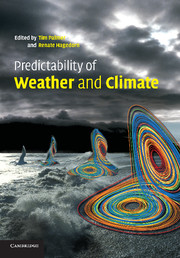Book contents
- Frontmatter
- Contents
- List of contributors
- Preface
- Chapter 1 Predictability of weather and climate: from theory to practice
- Chapter 2 Predictability from a dynamical meteorological perspective
- Chapter 3 Predictability – a problem partly solved
- Chapter 4 The Liouville equation and atmospheric predictability
- Chapter 5 Application of generalised stability theory to deterministic and statistical prediction
- Chapter 6 Ensemble-based atmospheric data assimilation
- Chapter 7 Ensemble forecasting and data assimilation: two problems with the same solution?
- Chapter 8 Approximating optimal state estimation
- Chapter 9 Predictability past, predictability present
- Chapter 10 Predictability of coupled processes
- Chapter 11 Predictability of tropical intraseasonal variability
- Chapter 12 Predictability of seasonal climate variations: a pedagogical review
- Chapter 13 Predictability of the North Atlantic thermohaline circulation
- Chapter 14 On the predictability of flow-regime properties on interannual to interdecadal timescales
- Chapter 15 Model error in weather and climate forecasting
- Chapter 16 Observations, assimilation and the improvement of global weather prediction – some results from operational forecasting and ERA-40
- Chapter 17 The ECMWF Ensemble Prediction System
- Chapter 18 Limited-area ensemble forecasting: the COSMO-LEPS system
- Chapter 19 Operational seasonal prediction
- Chapter 20 Weather and seasonal climate forecasts using the superensemble approach
- Chapter 21 Predictability and targeted observations
- Chapter 22 The attributes of forecast systems: a general framework for the evaluation and calibration of weather forecasts
- Chapter 23 Predictability from a forecast provider's perspective
- Chapter 24 Ensemble forecasts: can they provide useful early warnings?
- Chapter 25 Predictability and economic value
- Chapter 26 A three-tier overlapping prediction scheme: tools for strategic and tactical decisions in the developing world
- Chapter 27 DEMETER and the application of seasonal forecasts
- Index
- Plate section
- References
Chapter 25 - Predictability and economic value
Published online by Cambridge University Press: 03 December 2009
- Frontmatter
- Contents
- List of contributors
- Preface
- Chapter 1 Predictability of weather and climate: from theory to practice
- Chapter 2 Predictability from a dynamical meteorological perspective
- Chapter 3 Predictability – a problem partly solved
- Chapter 4 The Liouville equation and atmospheric predictability
- Chapter 5 Application of generalised stability theory to deterministic and statistical prediction
- Chapter 6 Ensemble-based atmospheric data assimilation
- Chapter 7 Ensemble forecasting and data assimilation: two problems with the same solution?
- Chapter 8 Approximating optimal state estimation
- Chapter 9 Predictability past, predictability present
- Chapter 10 Predictability of coupled processes
- Chapter 11 Predictability of tropical intraseasonal variability
- Chapter 12 Predictability of seasonal climate variations: a pedagogical review
- Chapter 13 Predictability of the North Atlantic thermohaline circulation
- Chapter 14 On the predictability of flow-regime properties on interannual to interdecadal timescales
- Chapter 15 Model error in weather and climate forecasting
- Chapter 16 Observations, assimilation and the improvement of global weather prediction – some results from operational forecasting and ERA-40
- Chapter 17 The ECMWF Ensemble Prediction System
- Chapter 18 Limited-area ensemble forecasting: the COSMO-LEPS system
- Chapter 19 Operational seasonal prediction
- Chapter 20 Weather and seasonal climate forecasts using the superensemble approach
- Chapter 21 Predictability and targeted observations
- Chapter 22 The attributes of forecast systems: a general framework for the evaluation and calibration of weather forecasts
- Chapter 23 Predictability from a forecast provider's perspective
- Chapter 24 Ensemble forecasts: can they provide useful early warnings?
- Chapter 25 Predictability and economic value
- Chapter 26 A three-tier overlapping prediction scheme: tools for strategic and tactical decisions in the developing world
- Chapter 27 DEMETER and the application of seasonal forecasts
- Index
- Plate section
- References
Summary
Introduction
To many people, probability forecasts are still much less familiar than traditional deterministic forecasts. Two issues are often raised as practical problems for the use of probabilities. First, there is a common perception that probability forecasts have no place in the real world, where users need to make hard yes/no decisions. Secondly there is the feeling that probability forecasts are difficult to assess – ‘probability forecasts are never wrong’, the scores are complicated, and different scores tend to show different ‘skill’. As an illustration of this last point, Figure 25.1 shows two examples of the evaluation of probabilistic skill for the ECMWF Ensemble Prediction System (EPS; Buizza, this volume; Palmer et al., 1993; Molteni et al., 1996; Buizza et al., 2003). The ROC skill score (based on the area under the relative operating characteristic (ROC) curve; Richardson, 2000, 2003) shows substantial skill, remaining above 40% throughout the 10-day forecast range. However, the Brier skill score (BSS; Wilks, 1995) decreases quickly so that there is no skill at all beyond day 8. Clearly, the two skill measures present contrasting perceptions of the performance of the EPS. This raises the obvious question of whether the forecasts are skilful or not and, perhaps more importantly, are the forecasts useful or not? It should be noted that these questions are not restricted to probability forecasts but are equally relevant to the more traditional deterministic forecasts.
- Type
- Chapter
- Information
- Predictability of Weather and Climate , pp. 628 - 644Publisher: Cambridge University PressPrint publication year: 2006
References
- 11
- Cited by



